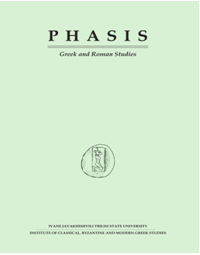Pygmalionismus. Über Narzissmus, Gender und Kunst
Pygmalionism. On Narcissism, Gender and Art
DOI:
https://doi.org/10.48614/phasis.23.2020.4-53Abstract
On the basis of Ovid’s story of Pygmalion in the tenth book of the Metamorphoses, the contribution at hand aims to demonstrate that the production of art cannot be traced back to a pure, ideal or august source: to a divine inspiration, for example, as postulated since Homer’s Iliad by the motif of the invocations of the muses; or to the autonomous creative subject of the modern aesthetics of the genius and aestheticism. Ovid, with his figure of the paradigmatic and tradition forming artist, illustrates that, on the contrary, art is based on something inferior and abject, namely on a narcissist misalliance of the artist towards his work, which, in the case of Pygmalion, grows into an incestuous structure of desire. Since Pygmalion’s narcissism is related to a, or rather his, simulacrum of the ideal woman, it is furthermore important to reconstruct the distortions pertaining to gender policies that can be connected to the creation of art.Downloads
Published
2020-10-07
Issue
Section
Articles
License
Copyright (c) 2020 PHASIS

This work is licensed under a Creative Commons Attribution-NonCommercial 4.0 International License.


